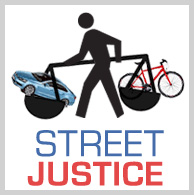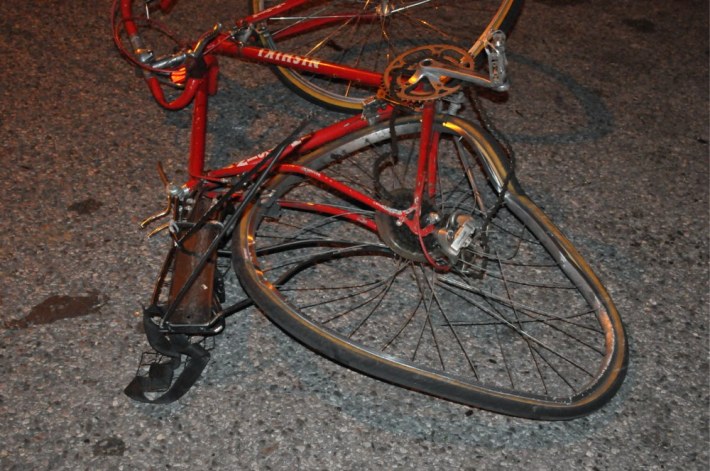As seasoned observers of the department's dealings with bicyclists know, NYPD has long enjoyed taking our bikes. Following the 2004 Republican National Convention, NYPD clipped locks and took bikes of persons suspected of associating with Critical Mass, resulting in a successful federal lawsuit that enjoined the practice as a constitutional violation. During a 2010 visit to New York by President Obama, NYPD without notice confiscated bikes wholesale along the president's route, failing to tag the bikes and making it extremely difficult for their owners to reclaim them. Now, NYPD has taken things to the next level by shuttering its bike pound for a year and a half, and refusing to allow owners to claim their bicycles indefinitely.
The problem came to light during efforts by the Lefevre family to retrieve the bicycle of fatal crash victim Mathieu Lefevre. [Disclosure: Steve Vaccaro of Vaccaro & White is counsel to the Lefevre family.] NYPD has moved to quash a court-ordered subpoena to produce the bicycle Lefevre rode the night he was killed. This comes on the heels of well-documented foot-dragging by the NYPD in failing to respond to the Lefevres’ requests for information in the immediate aftermath of their son’s death, drawing extensive press attention, from Streetsblog to the New York Times. The Lefevres ultimately sued the NYPD to get the investigative documents to which they were entitled, resulting in judicial criticism that NYPD "needlessly delayed handing over documents and other materials" in a manner "agonizing" to the family.
In this latest example of NYPD stonewalling, the Lefevres issued a subpoena to the NYPD to produce the bike for use as evidence against the driver. The Lefevres’ papers state that the bike is needed to reconstruct the manner in which the crash occurred, and to test the driver’s claim that he was unaware that he had struck Lefevre when he left the scene of the crash. A picture of the bicycle taken by police the night of the crash shows extensive damage:
Following his death, Lefevre’s bike was taken to NYPD’s central bike storage facility on Kingsland Avenue. The Kingsland warehouse is tucked away in a desolate corner of Greenpoint and houses thousands of bikes impounded after crashes or arrests. Right of Way activist Keegan Stephen, who retrieved his own bicycle from the warehouse prior to Superstorm Sandy, described it as "an expansive field of bikes, on multiple levels like outdoor parking garages; there were bikes farther than I could see."
The Kingsland warehouse was flooded during Sandy in October 2012. NYPD claims that no one has entered the facility since the storm, because “oil, sea water, and biological matter” have contaminated the building and it has been closed by OSHA. On this basis, NYPD states that the Lefevre bicycle is “unavailable.”
Since October 2012, several unsuccessful attempts have been made to retrieve the bike from the Kingsland warehouse. NYPD maintains that the facility cannot be entered. Meanwhile, the bike -- exposed to salt water and other contaminants -- presumably becomes more rusted and degraded, losing its value as evidence, with each passing day.
Rather than deploy a recovery team to clean up its bicycle warehouse, NYPD has deployed lawyers to quash the Lefevre subpoena. NYPD does not even care to venture a guess as to when it might open the facility and allow thousands of bicycle owners to claim their property. If NYPD ever does allow access to the facility, owners may well find that their bicycles have been ruined by salt water corrosion and rust during the passage of time since Sandy.
The NYPD’s neglect in reopening the Kingsland facility is inexplicable. A visit to the site reveals that Department of Sanitation and Department of Records facilities adjacent to the Kingsland bike facility -- which presumably were also flooded during Sandy -- are now open for business. Would car owners have been asked to wait over a year, or possibly many years, to retrieve their cars from a flooded tow pound? As the Lefevres argue in their papers:
The hardships imposed by Hurricane Sandy are undeniable, but [NYPD] is the custodian of relevant evidence and has a duty to preserve and deliver it as appropriate. Nothing in [NYPD’s] motion suggests that the subpoena imposes any greater hardship that that entailed in unlocking the warehouse, making a possibly unpleasant walk to the bicycle’s location, and retrieving it. This hardly makes the bicycle “unavailable.”
Streetsblog readers: Speak up in the comments if you believe you have a bike impounded at the Kingsland facility.







